Training One's Will
The idea to cycle across the entirety of the Chinese mainland popped into my head somewhat unannounced.
I was taking a long weekend during my year abroad, cycling around the historic Chinese town of Dunhuang, in the west of China. A coursemate Charley and I had decided to spend several days cycling inland, desperate for a taste of outdoor life after being cooped up for months in our respective university cities on China’s crowded urban coast.
Charley hated the cycling, though she was far too polite to say so. The dust made her cough uncontrollably, the hills were more challenging than we had expected, and, being inexperienced, we hadn’t brought enough water to fend off the aggressive sun.
I spent the long hours of our first 80-kilometer day feeling guilty at my complete lack of preparation and trying my best to encourage her. At the same time, the dust and climbing didn’t bother me at all. When we rode, I would stare transfixed at our surroundings, enamored by the dusty, empty roads, desolate mountain landscape, and revolving rural scenes of this country that, until now, I had only really seen the urban face of. There was so much of it. I wanted to see more.
The next day, I left Charley in a museum and headed out alone, flying along smooth tarmac — flat this time — with my speaker blaring, feeling so indescribably happy that something in that moment seemed to click. This was happiness. I had found it.
That was when a voice in my head whispered, “Why not do more of it, then?” And after a pause to think about what “more” meant, “What about cycling across the whole of China?”
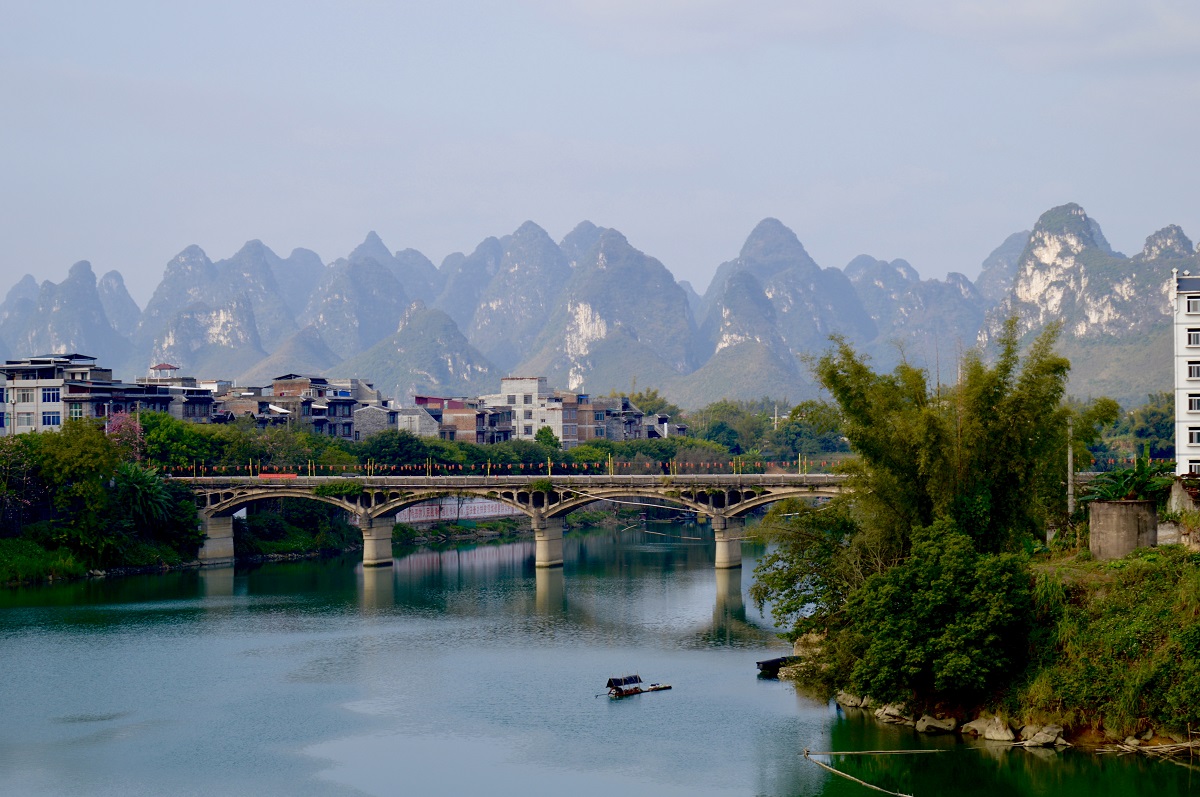
When I graduated from university, I saw my friends dive one after another headlong into city jobs working long hours in shiny glass buildings. I felt like I was standing at the bottom of a yawning cavern, looking up at a long escalator of professional development that I didn’t want to get onto just yet.
After a year and a half of saving funds, I found myself dragging 40 kilos of luggage through an enormous Chinese train station, waiting to be taken thousands of miles west to start my journey. I was exhilarated, exhausted, and mildly terrified.
There was no one I knew to immediately save me if things went wrong. And I found the idea intoxicating.
Nobody went with me. This was due in part to the roadblock of the global pandemic, which scuppered my parents’ and one best friend’s plans to fly from the UK to join me for a stretch, and forced me to push back my planned departure date by half a year. I was grateful I was able to do it at all: by August, China’s uncompromising lockdowns had largely controlled the virus, and people were back at work as normal, though single-digit “imported cases” were still front-page news every other day, and racism against foreigners was commonplace. I worried slightly about the possibility of being denied entry into hotels, or possibly even whole cities, but judged this risk to be minimal and reasoned I could always go around.
I was also secretly pleased to be doing this alone. Growing up in a large and loving family is one of the greatest gifts I could possibly have been given, but it had one side effect: I felt that I had never really achieved anything in my life on my own. Whenever I faced challenges, I was spoiled in my choice of people to turn to for help or encouragement. I had done well in school because I always had help with my homework. Even my Mandarin skills had come from the fantastic international school my parents sent me to.
Traveling solo — especially on a bicycle — and staying in a tent meant doing pretty much everything myself. Choosing routes, measuring risks, budgeting, solving problems, giving encouragement and comfort. There was no one I knew to immediately save me if things went wrong. And I found the idea intoxicating.
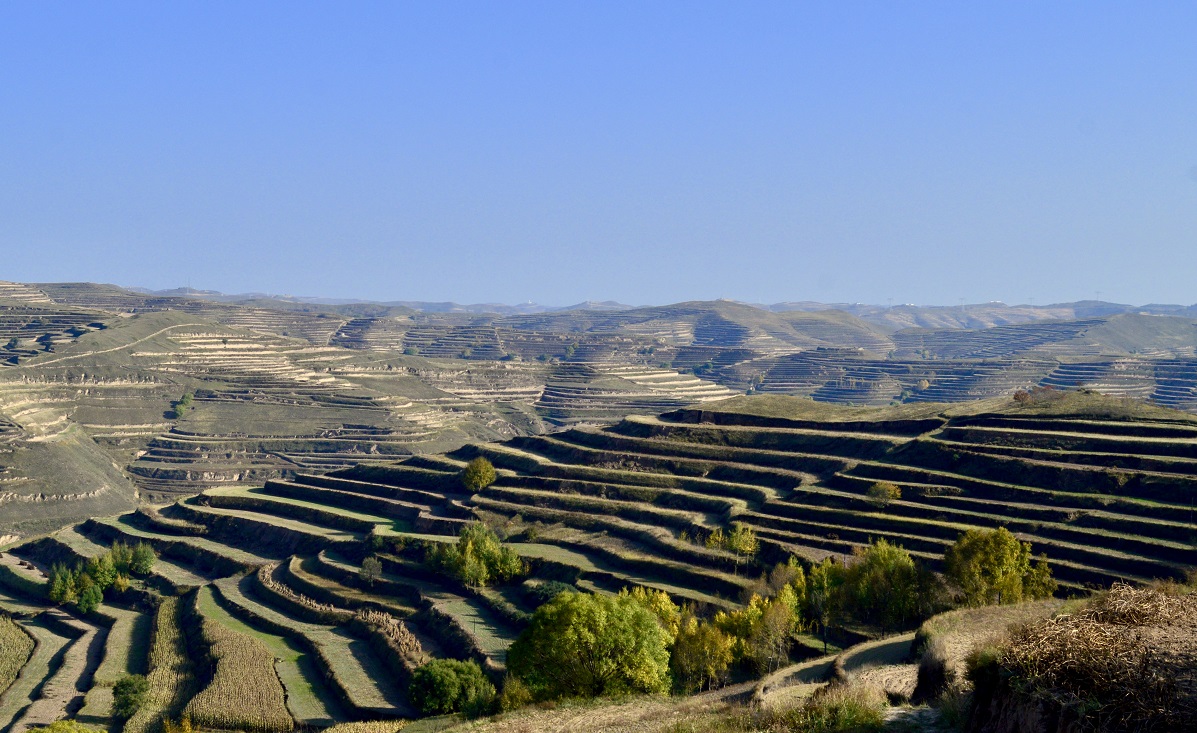
An Unbelievable Journey
My journey started in Gansu Province in the corner of the Gobi desert in late August in exactly the same town I had first conceived of the idea: Dunhuang. I had initially planned to start closer to the Russian border, but a COVID outbreak in Ürümqi made it impossible to travel to the entire province of Xinjiang. It was surreal to be back in Dunhuang; the streets, the smells, the air, and the sheer feeling of joy were exactly the same.
I set off with glee into the late summer morning, hardly able to believe what I was doing. The first night that I camped in a field under the stars was warm, breezy, and quiet, a world away from the busy city, and I stared at the sky in enraptured contentment. For dinner, I ate a melon a girl had given me from her farm nearby. Everything I needed for the next three months — a few changes of clothes, tent, sleeping bag, camp stove, pan, camera, and bike tools — was all packed into two panniers. Every night, I slept for long hours, rising with the sun to continue riding south, eating whenever I passed a rural convenience store or mom-and-pop noodle stand, talking little, drinking in the vast scenes of red mountains and shrub-dotted deserts around me.
West Gansu sees only 1.5 inches of rainfall per year, and the skies remained bright blue and cloudless. I sped along the 1,000-kilometer length of Gansu, the long corridor of the ancient Silk Road, mostly alone and at peace. I camped by still reservoirs populated by birds and wild grasses and passed crumbling towers of the Great Wall left abandoned to the elements in places where few tourists would stray.
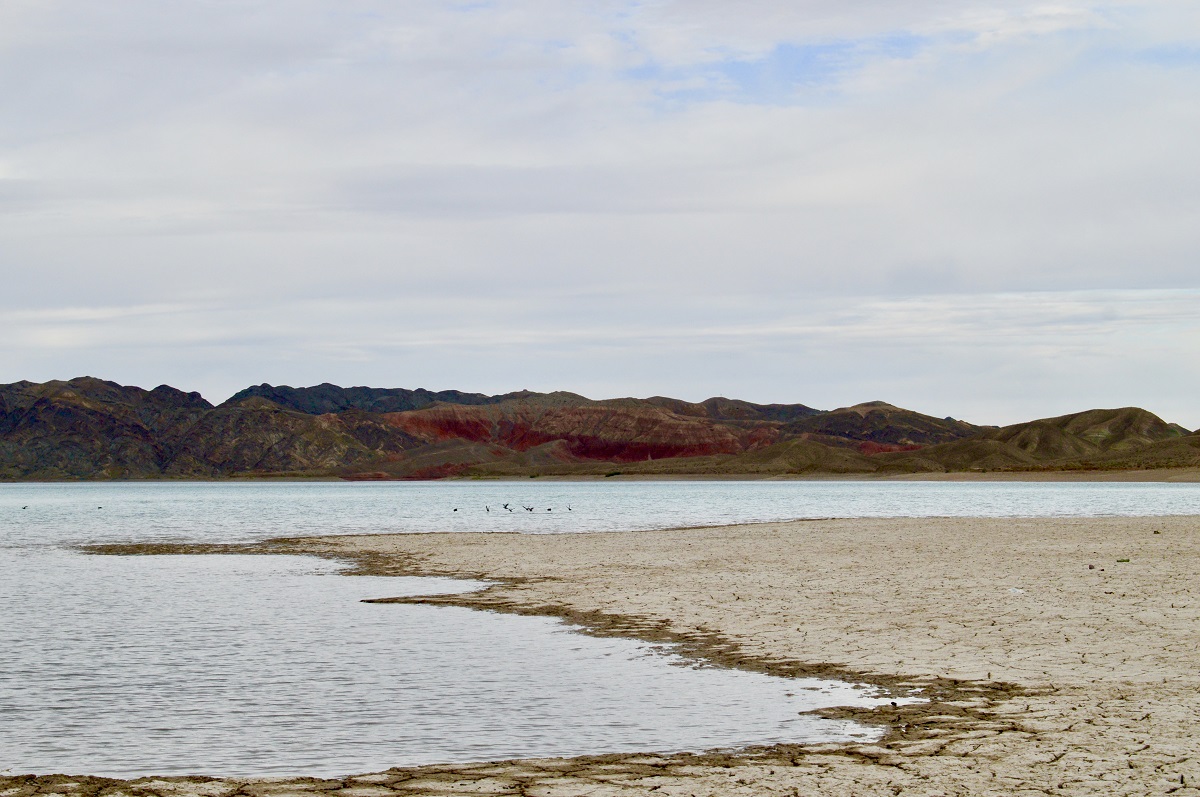
I rode anywhere between 30 and 130 kilometers per day depending on terrain and weather, resting every few days when I reached a town or wanted to explore. Amazingly, almost everything logistical went to plan. There was one day in which terrible road quality in a particularly remote desert stretch — the road practically disappeared and turned into sand — meant the distance took several times longer than expected, and I ran out of water. The area was uninhabited for 40 kilometers in any direction, and I was scared that I would pass out from dehydration if I couldn’t get to a road before dark. With nobody around for miles and no signal on my phone, if I fainted or was bitten by something venomous, there was a real risk of dying. After four or five hours of bumping the bike over the sand, I made it to a village. Water never tasted so good.
Once I reached the mountains of central Sichuan Province and to a lesser extent Guizhou and Chongqing provinces below it, I started to worry that I would freeze in the tent overnight. The blanket of evening clouds on the mountainside was icy, and on several nights temperatures dropped below zero so that I woke every other hour with my numb feet and fingers demanding attention.
Some of my happiest moments on the trip came from finding somewhere small and strange to shelter, sipping cheap Chinese rice liquor by my fire, safe in the company of spiders.
I passed through cities every few hundred kilometers, and these were my oases of comfort and technology, though I felt bizarrely out of place in them with my single set of dirty casual clothes and generally unkempt appearance. I would book a cheap hotel and revel in the clean sheets, hang up my tent and sleeping bag to dry (making the room smell like a garden shed), and wash my filthy clothes in the sink. I would wander around town to take photographs and talk to curious locals before setting out again. Most people I met had never spoken to or even seen a foreigner before, and everywhere I went, eyes and whispers followed me. I spoke to many people who were shocked that I spoke Mandarin, and instantly full of questions: “Where are you from? Why do you speak such good Chinese? The pandemic is really bad in your country, right? What do you think of China? What age do people get married in your country?”
By far the most amazing parts of my journey were the views. On mountain roads that most cars avoided in favor of the speedier highways, I was treated to breathtaking landscapes of the China of hundreds of years ago: bamboo-covered mountains with pagodas perched on their peaks, twisting agricultural terraces and the isolated wooden-beamed villages that tilled them, oxen pulling plows, tiny old ladies wrapped in purple cloth carrying babies in woven baskets along roads that traced huge rocky ravines.
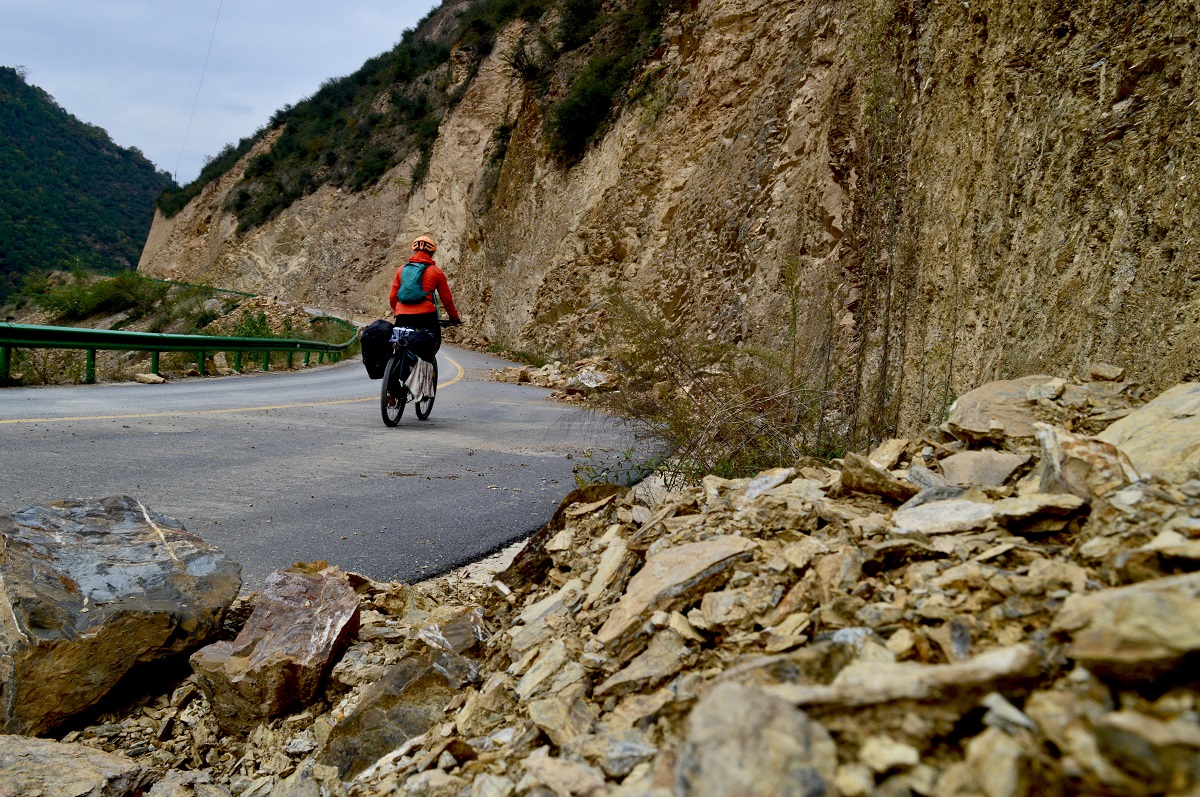
Abandoned buildings were everywhere, either villas that spoke of someone’s overenthusiastic investment in tourism, or the overgrown remains of family pig farms crowded out of the market by larger industries. Any removable roof tiles and metal gates had usually been stripped away for use elsewhere. I sheltered in many of these building shells that still had roofs, always preferring to camp somewhere I would be protected from wind and rain and where I could build a fire. Some of my happiest moments on the trip came from finding somewhere small and strange to shelter, sipping cheap Chinese rice liquor by my fire, safe in the company of spiders. I felt pleasantly reduced to a primitive, animalistic existence, in which rain and cold were the enemies, warmth and safety reigned supreme, and I preferred to stay out of sight.
“Aren’t You Scared?”
Both before I left and while I was on the bike trip, people constantly asked me with incredulity whether I wasn’t scared about cycling alone, female, in a foreign country for three months.
My stock answer was a question in return: “Scared of what?” Which I thought at the time was a clever way of forcing my inquisitor to examine their own fears and assumptions. Chinese people would usually shake their head in disbelief and say, in bizarrely uniform phrasing, “You’re right. China is a very safe country.” Western people were less veiled. “Camping on your own? What if you get attacked?”
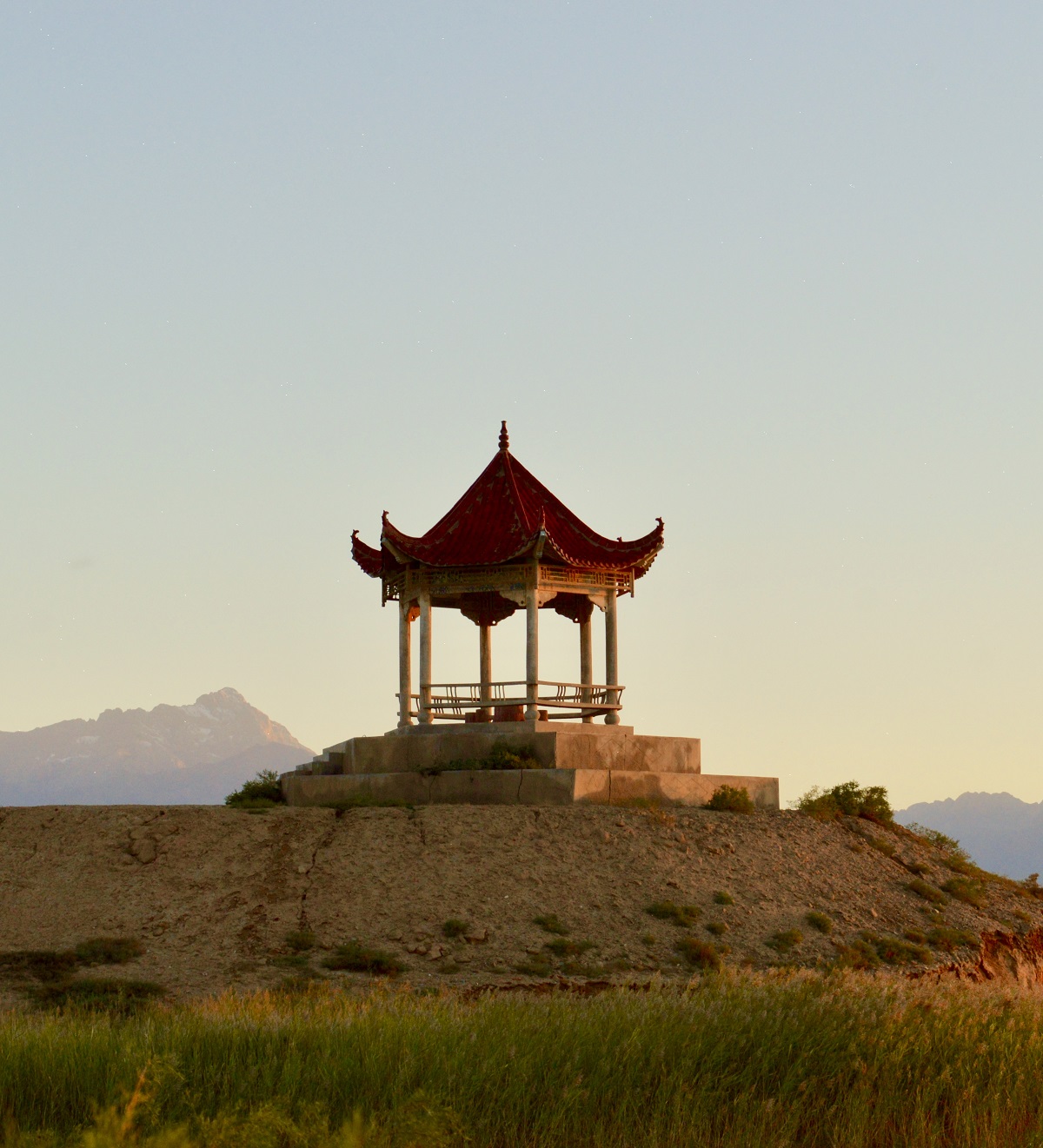
Now, having completed my journey, I look back and realize that yes, in fact, I was scared. As a female traveler in a country that is very much still developing, despite how Shanghai’s towering skyscrapers may make things look, the thought of being robbed, attacked, or worse was always there. I slept with a knife in my hand most nights and measured everyone I met in terms of the possible danger they posed. I reported my location to my family every 24 hours. I locked my bike or kept it on the porch of my tent or in my hotel room. I kept my valuables close and well protected. I had accident insurance, emergency contacts, and a hefty emergency fund.
But I knew the country well and trusted in its general safety as well as my ability to change my behavior according to my instincts. In the rare instance that anyone made me uncomfortable, I moved on swiftly. If a lone man saw me set up camp, I packed up and changed location. I never went to bars alone and told anyone suspect that I was traveling with my husband. He was just behind me — he carried all the water, so he was slow.
I was training my will to be stronger than my fears.
Besides, a vast majority of positive experiences balanced out my fear. As always happens when traveling, the general kindness of strangers blew me away. Whenever I had a puncture, several people stopped to ask if I needed help. Once when I was struggling up a mountain in the dark in Guizhou, someone stopped to give me a lift and then a hot dinner and found me a place to stay. In Qinghai province, the police who informed me I was traveling through a restricted military zone where foreigners were not able to camp and apologized profusely before driving me for nearly two hours to a hotel of my choice and plying me with food and soft drinks the whole way there. Far more than I was made uncomfortable, I was shown kindness and showered with praise. “You’re so brave. You’re so li hai.” (A word that literally means fierce, but translates better as impressive or amazing). “I could never do what you’re doing.”
Always, I kept this mantra in my head: If your dreams don’t scare you, they aren’t big enough. Overcoming doubt on my own was exactly what I had wanted; I was training my will to be stronger than my fears.
The Lesson
Over three months — my total time was 106 days before I reached Guangzhou on the coast — I got to know myself inside and out: my weaknesses, my strengths, what was essential to my happiness, and what wasn’t. I realized, for example, that coffee in the morning made my day, and that I cycled better if I waited a while before I had breakfast. Face wash and eyebrow tweezers were essential; lip balm wasn’t. My left knee was weaker than my right. My average sleep lasted 11 hours. I slept better with a hat on. I preferred flat roads to mountains, no matter how nice the view.
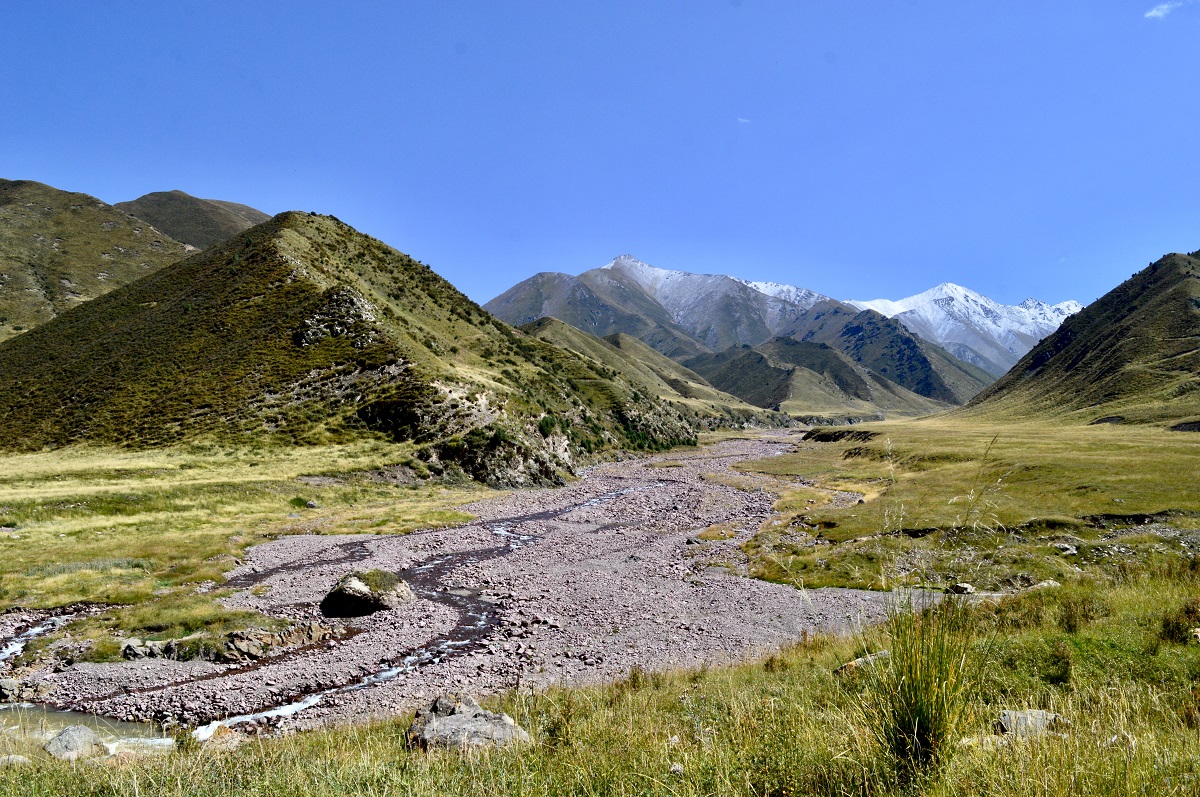
I got to see so much more of this enormous country that I love: temples carved into mountainsides, entire villages all drying curtains of noodles outside their single-story homes, and the vast variety of cultures and places that fall under the umbrella of China.
The absolute freedom of bike touring was also unbelievable. If I liked someplace, I stayed a day or two. If I didn’t, I left without ceremony. I ate whatever and whenever I wanted, and if I wasn’t in the mood to socialize, I didn’t. I could randomly decide to splurge on a five-star hotel with a swimming pool, or I could camp in a rubbish-strewn car park. Those three months felt like the grounding I needed, reminding me that no matter which city I live in, or where I find myself in my life or work, there will always be a wilder world out there that is only a few months of planning away.


Comments
Forgot Password?
Enter your email address and we'll send you an email that will allow you to reset it. If you no longer have access to the email address call our memberships department at (800) 755-2453 or email us at memberships@adventurecycling.org.
Not Registered? Create Account Now.